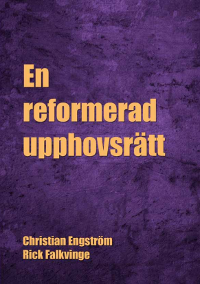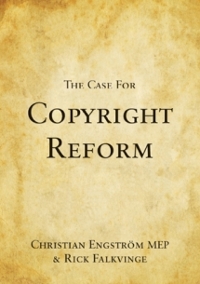
Chair. Can be owned without restrictions.
Copyright is not the same thing as the right to property. It is a restriction on the right to property.
Suppose that I buy a chair. I go into a shop, perform the ritual of selling and buying, and hand over the money. The chair is now my property, and I can do whatever I want with it. I can allow other people to sit on it for a charge, I can manufacture my own copies of it, or I can transform it into something new and sell it. Since I am the owner of the chair, these are some of the things I am allowed to do with my property.
But suppose that I buy a copy of a film instead. Again, I go into the shop, perform the ritual of selling and buying, and hand over the money. That copy of the film is now my property, but I am still not allowed to do what I want with it. I am not allowed to show it to other people for a charge, I am not allowed to manufacture my own copies of it, and I am not allowed to transform it into something new and sell it. Although I am the owner of the copy of the film, copyright places restrictions on what I may do with my property.
You can argue if the restrictions on the right to property that follow from copyright are good or bad, but you cannot deny that they are restrictions.
Copyright is in conflict with the right to property. It is not a part of it.
The same reasoning applies to patents and protected designs.
If the chair I bought contains some technical solution that has been patented, I am not allowed to manufacture copies of it and sell. In fact, I am not allowed to manufacture and sell any chair that contains the patented solution, regardless of whether I use an existing chair as the model or not. Although I own the wood and the tools that are necessary to do it, I am not allowed to. Patents are a restriction on the right to property.
Design patents, or protected designs, work the same way. Most ordinary chairs have no design protection. Then I am free to make as many copies as I want. But if the chair I bought is covered by design protection, I am not allowed to make copies of it and sell, even if I own the wood and the tools necessary. Just like patents, protected designs are a restriction on the right to property.
Again: You can discuss if these restrictions on the right to property are good or bad. For instance, the Pirate Party wants to keep most of the copyright legislation for commercial purposes, even though we admit that this is a restriction on the right to property.
But you cannot defend copyright, patents, or protected designs by saying that you consider the right to property sacred. It is as if someone would defend the death penalty with the argument that life is sacred. That particular logic doesn’t work.
…………
This text in Swedish
Tags: piratpartiet, eu, politik, informationspolitik
 Christian Engström, former Member of the European Parliament 2009-2014 for Piratpartiet, Sweden
Christian Engström, former Member of the European Parliament 2009-2014 for Piratpartiet, Sweden




[…] This text in English […]
Pingback av Upphovsrätten inskränker äganderätten « Christian Engström, Pirate MEP — 4 september 2011 @ 23:52
” I can manufacture my own copies of it”
Is it true, though? Chair’s design might be protected by the copyright law, or can it not?
Kommentar av Stewie Orf — 5 september 2011 @ 0:00
@Stewie Orf
You may manufacture copies for your own use, but you may not sell them (as I understand it)
Kommentar av ConnyT — 5 september 2011 @ 7:10
To me this argument doesn’t seem very convincing. Maybe it works on hardcore libertarians, but if you consider that the majority in our country support high taxes the restrictions due to copyright seems very minor in comparison. I think most people conceptually don’t think of copying as molding of private property. As I see it this argument only works for preaching to the choir.
I think it’s more fruitful to discuss questions like:
Is copyright an individual right or a privilege we give to individuals for the purpose of societal advance?
If it is an individual right and a form of private property, wouldn’t limiting the term amount to state confiscation of private property?
If copyright is more of a utilitarian system, what criteria do we use when determining the terms and does that view change how we view restrictions on people’s freedoms in the name of enforcing copyright?
Kommentar av Tor — 5 september 2011 @ 8:10
[…] the nature of the legislation — that it is an exclusive right, or a monopoly, that is in opposition to property rights, and is not a property right itself. Just this straightforward use of accurate, descriptive […]
Pingback av Why I Insist On Saying “The Copyright Monopoly” - Falkvinge on Infopolicy — 12 september 2011 @ 11:01
[…] sur le fait qu’il s’agit d’un droit exclusif, ou… monopole, lequel est en opposition aux droits de la propriété, et n’en est justement pas un. Le simple fait d’employer des termes précis et […]
Pingback av Ne dites plus Copyright mais Monopole du Copyright ! | Dico Micro — 14 september 2011 @ 16:01
”Chair. Can be owned without restrictions.”
Best caption EVER!
Kommentar av Autolykos — 24 oktober 2011 @ 12:41
I believe this is a very important discussion specially because it is impossible to control the piracy. The new technological era urges a review on the legislation once the distribution revolution is already happening. The success of Youtube and Itunes are samples of that where the creators are able to publish and distribute their material for free or charging less than the producers would charge.
However I read this text the same way @Stewie Orf does ”You may manufacture copies for your own use, but you may not sell them”
Kommentar av Fab — 5 december 2011 @ 0:50